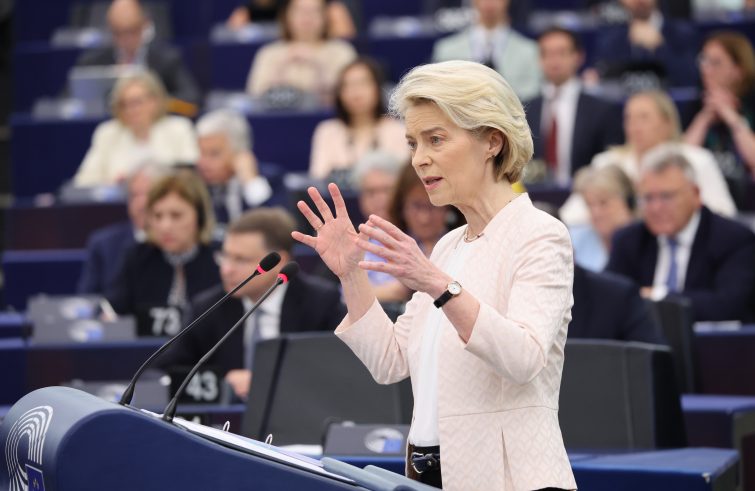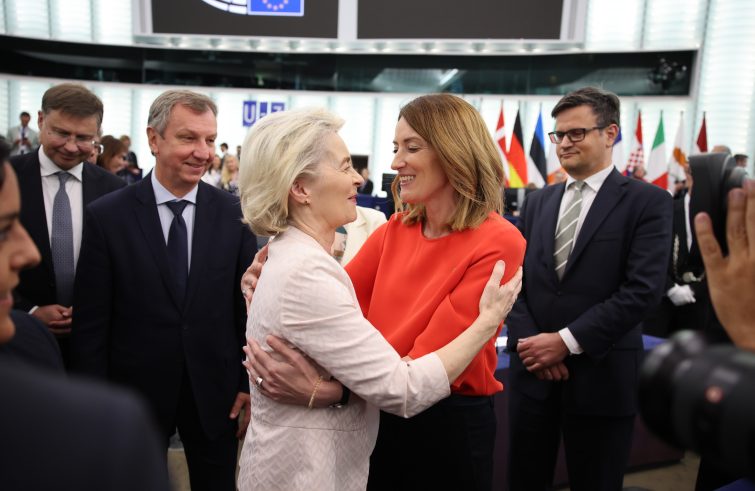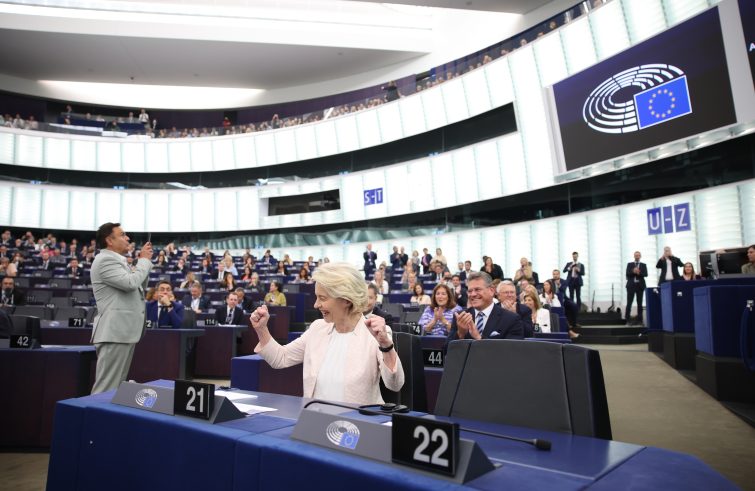
It will be a long and winding five-year journey. This is the road ahead of Ursula von der Leyen and, even more, of the European Union. Last week’s vote in Strasbourg to elect the President of the European Parliament and then the President of the Commission confirmed that the EU’s integration process can continue, despite the big gains made by the far-right sovereigntist and anti-European forces in the 6-9 June elections, each with their own peculiarities.
Moreover, it has become clear that, not least because the pro-European forces themselves – or the self-proclaimed pro-Europeans – are showing obvious divergences and some rifts, the road to a more cohesive, efficient and modern Europe will by no means be a walk in the park.
Numbers and majority. The two ballots held in the Hemicycle of the European Parliament on 16 and 18 July revealed, first and foremost, certain differences in popularity (and roles). MEPs re-elected Roberta Metsola (Malta, EPP) as President of the Parliament with 562 votes out of 623 valid votes (699 voters, 76 blank and invalid votes). Ursula von der Leyen (Germany, EPP) was re-elected with 401 votes out of 707. She received 284 votes against, 15 abstentions and 7 blank votes. On paper, von der Leyen could count on 454 votes, i.e. those of the four political groups that had expressed their support for a second mandate: the People’s Party, the Socialists and Democrats, the Renew Liberals and the Greens. The votes of the Greens were decisive, as there were apparently about 50 defectors. It has been observed that the ‘Ursula majority’ has moved to the left, with Green Party connotations. However, those who predicted political turmoil in the EU after the June vote can hardly claim to have been right.
- (Foto Commissione europea)
- (Foto Commissione europea)
The College of Commissioners. After the vote in Strasbourg, the Commission President faces another difficult challenge: the appointment of the Commissioners. In the coming weeks, the member states will propose the candidates for commissioner (two per country) to von der Leyen. She will then decide on the portfolios to be assigned to each of them, after which the proposed commissioners will face hearings in the relevant committees of the European Parliament, followed by a final vote by the European Parliament to confirm the college, almost certainly in October. The Commissioners will be “vetted” according to the Commission’s programme for the period 2024-2029, which the President herself will present to the European Parliament.
Commitments and promises. Von der Leyen’s policy priorities (outlined in a 30-page document that lacks both momentum and futuristic vision) cover a wide range of issues, with a few nebulous promises here and there. The chapters are numerous: economic prosperity, support for agriculture, the Green Deal, safeguarding democracy and the rule of law, security and defence, foreign policy (Ukraine, the Middle East, the US, China, NATO…), enlargement, the social rights pillar, opportunities for young people. “We need an ambitious reform agenda to ensure the proper functioning of an enlarged EU, to address geopolitical challenges and to enhance democratic legitimacy, in particular through citizen participation,” said von der Leyen in her speech to the European Parliament, envisaging a revision of the Treaties, if necessary. She spoke at length about security and defence (a task that, however, is the primary responsibility of the Member States, not the EU); she mentioned the fight against crime, cyber threats and drug trafficking. She was evasive on migration, except reiterating the importance of border control and the fight against human trafficking, followed by support for the effectiveness of the new Pact on Migration and Asylum. She expressed her support for EU enlargement to the Balkans, Ukraine, Moldova and Georgia, stressing the ‘enormous geostrategic responsibility’. The focus then turned to the “social pillar”, with reference to consumer protection, working conditions and collective bargaining, the housing crisis, child protection, combating violence against women and the commitment to promote gender equality and the reconciliation of work and family life.
Seeking support. In order to achieve all this, von der Leyen will have to secure the support – which cannot be taken for granted – of the other EU institutions (Parliament and Council), of the political groups that animate the Strasbourg hemicycle and, last but not least, of the 27 governments of the Member States, or at least the most influential ones that, in the absence of concrete alternatives, have facilitated her second mandate: namely Germany, France and Spain. Relations with the European Parliament are going to be crucial in ensuring that the political choices and regulations proposed from time to time enjoy added “democratic legitimacy”. The President will necessarily have to rely on the coalition that has entrusted her with its confidence, without neglecting its underlying lack of homogeneity. On the other hand, she will be confronted in Strasbourg with a third of the MEPs who are sovereigntist and who regard her with annoyance. Fortunately for her, von de Leyen can count on the fact that the sovereigntist MEPs are diverse and divided, which makes them potentially irrelevant.













